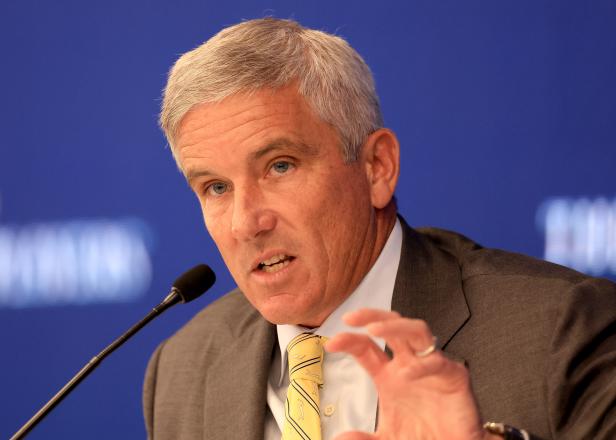On April 17th, 2021, about a week after Hideki Matsuyama won the Masters and sparked giddy conversation about a global golf explosion–perhaps to be realized decades into the future by a slew of even greater Asiatic champions–executives at an international golf consulting firm, two of whom graduated from the University of St. Andrews in Scotland, sent a letter across the Atlantic ocean to the desk of Jay Monahan in Ponte Vedra. With a pledge of Saudi Arabian backing from the Public Investment Firm, it outlined a series of “super” professional golf events that would sit atop the existing ecosystem of established tours. Much hand wringing went into making the tone of the letter seem not aggressive, rather respectful and cooperative.
Jay Monahan didn’t respond to the letter. He would not meet with these people.
On the morning of June 6th, 2023, Monahan teed it up at Deepdale Golf Club in New York with his new chairman, Yassir al Rumayyan, before flying to Toronto to tell PGA Tour pros at the Canadian Open about his change of heart. Or mind, depending on one’s view of where morality resides.
Holding to a fixed, unmoving position is not necessarily a requirement of moral behavior. To be open to the change that comes with intellectual reflection is a key element of growth. Same as diplomats continually wrestle to balance interests with foreign leaders whose other actions they find reprehensible, so too did Jay Monahan weigh the futures of hundreds of pro golfers and the game at large in an unstable world. He can be forgiven for taking nearly two years to get here. He can be forgiven for changing his mind.
Though Monahan isn’t owed forgiveness from the families of 9/11. Nor will he likely get it from many pros, agents, politicians, media and fans he convinced to amplify his message that to play for the Saudis equated to immorality. “I would ask any player that has left, or any player that would consider leaving, ‘Have you ever had to apologize for being a member of the PGA Tour?'” are just some of several incendiary words that will forever glow like embers. He engaged his constituency emotionally, rather than pragmatically, and that’s why the turnabout burns. People understand that legal and business landscapes shift, and reversals get made behind closed doors. But changes in morality must occur in the open. A sudden appearance on CNBC was galling.
Of course, the nature of mergers and acquisitions is secrecy. We marveled at how top players and tour executives didn’t know about the deal, but that’s how these things go down. Notice how the alleged other architects of the deal have remained out of the spotlight and the humbling experience of changing one’s stance publicly.
What if Jay Monahan had never framed the fracture in professional golf on moral grounds? What if he had just focused on the strengths of the PGA Tour without attacking the values of the opposition? In all likelihood, we’d have ended up in the same place. The financial arm of the royal family of Saudi Arabia, an entity with limitless money, wanted to get into golf and wouldn’t take no for an answer.
“Sports have become a unique asset class, one with returns better than the best art in the world,” says Professor Marty Conway, who teaches classes in international sports management at Georgetown University. With Uber as just one example, “The PIF likes to get into business spaces and widen them out across countries and cultures.” Sports-washing is too simplistic a term. “The proliferation of dollars going from east to west is unsettling for people who’ve watched it go the other way for 70 years.”
How the modern forces of technology, globalization and capitalism will converge is overwhelming to consider. Might a niche game like golf become an entertainment behemoth justifying billions of dollars in investment, you know, like where it actually makes sense for a golfer to win a single check that’s greater than Jack Nicklaus’ career earnings? If golf gets popular like soccer, another sport into which Saudi Arabia is in deep, then maybe, yes. Jay Monahan has asked that we judge him in 10 years.
But because of the speed and concealment by which he changed course, that judgment will come the next time a human rights atrocity occurs in Saudi Arabia. For the sake of all of us, naive as it may sound, let’s hope that’s far off.
